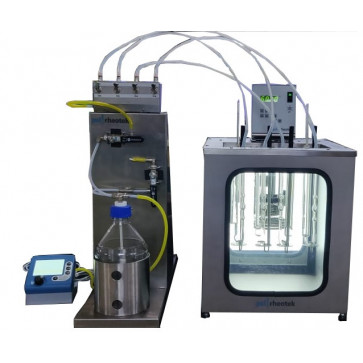RPV-1 Two positions Polymer Viscometer
Inquire productThe PSL Rheotek RPV-1 (2) provides a reliable and precise system for measuring dilute solutions of polymers.
The RPV-1 automates the manual steps set out in standard methods, minimizing the variability of results.
Systems can be configured with 1 to 4 measuring positions. Other options include sample preparation,
sample dissolution and auto sampler.
Flow times are measured automatically using ASTM Ubbelohde viscometer tubes supplied with ISO 17025
certificates of calibration.
Cleaning is carried out in-situ utilizing solvents and a safe vacuum system.
The comprehensive RPV-1 software program records all measurement data as well as calculating a wide
range of results.
| Standard Practice: |
| ASTM D2857 Determination of the dilute solution viscosity of polymers. |
| Test Methods General: |
| ISO 1628 Part 1 Determination of the reduced viscosity, intrinsic viscosity and K-value of polymers in dilute solution using glass capillary viscometers |
| Test Methods Polyamides (PA): |
| ASTM D789 Determination of the Relative Viscosity of Polyamide (PA) |
| ISO 307 Determination of viscosity number Polyamides |
| Test Methods Poly (Ethylene Terephthalate) PET: |
| ASTM D4603 Determination of the Inherent Viscosity of Poly (Ethylene Terephthalate) PET |
| ISO 1628 Part 5 Determination of the viscosity number (reduced viscosity) of Poly (Ethylene Terephthalate) PET, poly (butylene terephthalate) PBT, poly (cyclohexylenedimethylene terephthalate) PCT and poly (ethylene naphthalate) PEN. |
| Test Methods Poly Vinyl Chloride (PVC): |
| ASTM D1243 Determination of the Inherent Viscosity of vinyl chloride polymers in cyclohexanone. |
| ISO 1628 Part 2 Determination of the reduced viscosity (viscosity number) and K-value of PVC resins. |
| Test Methods Cellulose Acetate: |
| ASTM D871 Testing Cellulose Acetate |
| ISO 1599 Determination of Viscosity Loss on moulding of Cellulose Acetate. |
| Other Test Methods: |
| ASTM D445 Standard Test Method for determination of kinematic viscosity |
| ISO 3104 Petroleum products – determination of kinematic viscosity |
| IP 71 Section 1 Kinematic Viscosity |
- Specifications
-
Typical RPV Applications And Configurations Polymer Test Method Solvent Concentration Temperature RPV Measuring Positions PA ASTM D789 Formic acid 8.4% 25°C 2 to 4 PA ISO 307 Formic acid 0.5% 25°C 1 to 4 PA ISO 307 Sulphuric acid 0.5% 25°C 1 to 4 PA ISO 307 M-Cresol 0.5% 25°C 1 to 4 PET ASTM D4603 Phenol/Tetrachloroethane 0.5% 30°C 1 to 4 PET ISO 1628-5
DIN 53728Phenol/Dichlorobenzene 0.5% 25°C 1 to 4 PET ISO 1628-5 Dichloroacetic acid 0.5% 25°C 1 to 4 PVC ASTM D1243 Cyclohexanone/THF 0.2% 30°C 1 to 4 PVC ISO 1628-2 Cyclohexanone 0.5% 25°C 1 to 4 - Download

